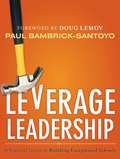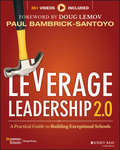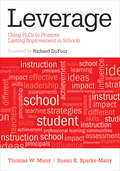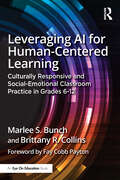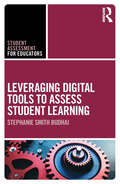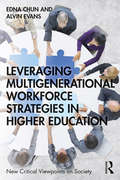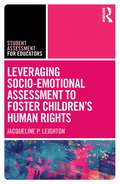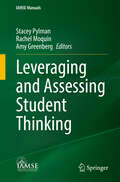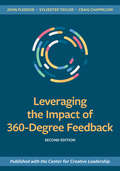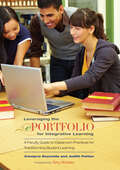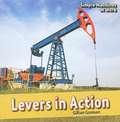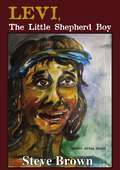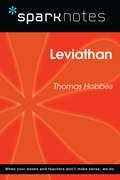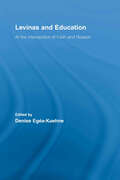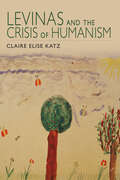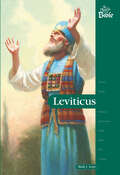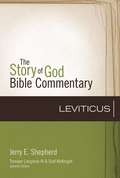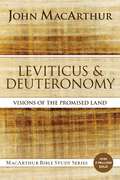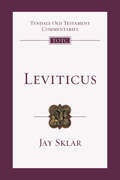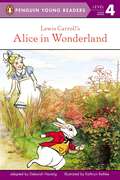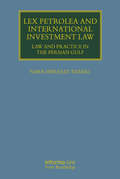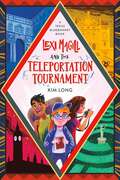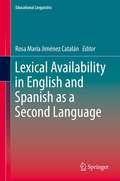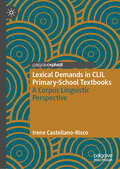- Table View
- List View
Leverage Leadership
by Doug Lemov Paul Bambrick-Santoyo Brett PeiserPaul Bambrick-Santoyo (Managing Director of Uncommon Schools) shows leaders how they can raise their schools to greatness by following a core set of principles. These seven principles, or "levers," allow for consistent, transformational, and replicable growth. With intentional focus on these areas, leaders will leverage much more learning from the same amount of time investment. Fundamentally, each of these seven levers answers the core questions of school leadership: What should an effective leader do, and how and when should they do it. Aimed at all levels of school leadership, the book is for any principal, superintendent, or educator who wants to be a transformational leader. The book includes 30 video clips of top-tier leaders in action. These videos bring great schools to you, and support a deeper understanding of both the components of success and how it looks as a whole. There are also many helpful rubrics, extensive professional development tools, calendars, and templates. Explores the core principles of effective leadershipAuthor's charter school, North Star Academy in Newark, New Jersey, received the highest possible award given by the U.S. Department of Education; the National Blue RibbonPrint version includes an instructive DVD with 30 video clips to show how it looks in real life. E-book customers: please note that details on how to access the content from the DVD may be found in the e-book Table of Contents. Please see the section: "How to Access DVD Contents" Bambrick-Santoyo has trained more than 1,800 school leaders nationwide in his work at Uncommon Schools and is a recognized expert on transforming schools to achieve extraordinary results.
Leverage Leadership 2.0: A Practical Guide to Building Exceptional Schools
by Paul Bambrick-SantoyoCut through the mystique to learn the real drivers of great school leadership Leverage Leadership 2.0 answers the basic question: what do great school leaders do that separates them from the rest? Rooted in the observation and training of over 20,000 school leaders worldwide, Leverage Leadership 2.0 offers a practical, updated and easier-to-use follow-up to the original, with field-tested techniques and actionable advice. As educational leaders around the world implement Leverage Leadership ideas, their collective stories have revealed a simple framework by which the seven levers may be implemented: See It, Name It, Do It. This book aligns classic Leverage Leadership principles with this proven framework to streamline implementation and help good leaders become great. Expert discussion and real-life success stories prove that effective leadership is not about innate charisma, charm, or personality—it’s about how a leader uses their time. Aimed at all levels of school leadership, this book shows you what to do, and how and when to do it. The companion DVD includes 30 real-world videos that showcase effective leadership happening in our schools right now, and all templates, tools, and other professional development materials have been fully refreshed with a renewed focus on real-world implementation. Informational, inspirational, and highly motivational, this book explores both the separate components of success and what it looks like as a whole. Learn the core principles of effective leadership Understand what success looks like on the ground Practice the seven levers of leadership that allow transformational growth Adopt the tools and techniques that facilitate a schoolwide transformation Educational leaders from a diverse array of schools around the world have found unprecedented success using the key principles detailed in Leverage Leadership, and this book is inspired — and informed — by their stories. Leverage Leadership 2.0 is the practical resource school leaders need to start making real change happen today.
Leverage: Using PLCs to Promote Lasting Improvement in Schools
by Thomas W. Many Susan K. Sparks-ManyDiscover high-impact leadership strategies for a thriving learning community! This compelling new book provides straightforward guidance and solutions for educators working to transform their school environments. Concrete examples of practical, high-impact, and evidence-based practices help you leverage the “big ideas” of Professional Learning Communities to promote lasting improvement in your school. You’ll learn to: Understand the essential role principals and teacher leaders play in leading PLCs Foster an understanding of how PLCs can support implementation of major instructional shifts such as the new Common Core State Standards Apply high-leverage strategies across your own school and district to improve instruction
Leverage: Using PLCs to Promote Lasting Improvement in Schools
by Thomas W. Many Susan K. Sparks-ManyDiscover high-impact leadership strategies for a thriving learning community! This compelling new book provides straightforward guidance and solutions for educators working to transform their school environments. Concrete examples of practical, high-impact, and evidence-based practices help you leverage the “big ideas” of Professional Learning Communities to promote lasting improvement in your school. You’ll learn to: Understand the essential role principals and teacher leaders play in leading PLCs Foster an understanding of how PLCs can support implementation of major instructional shifts such as the new Common Core State Standards Apply high-leverage strategies across your own school and district to improve instruction
Leveraging AI for Human-Centered Learning: Culturally Responsive and Social-Emotional Classroom Practice in Grades 6-12
by Marlee S. Bunch Brittany R. CollinsLeveraging AI for Human-Centered Learning provides intentional approaches to the integration of artificial intelligence tools into middle and high school classrooms, specifically to foster equity and social-emotional wellbeing. The overlap of AI with today’s schools poses pivotal questions about ethics, morality, inclusion, and human learning at a time when students are already reckoning with public health crises, systemic injustice, and other connected challenges. This book helps teachers examine the pros and cons of artificial intelligence—as used by both educators and students—as well as its implications for meaningful culturally responsive teaching and social-emotional learning efforts. Featuring activities, lesson plans, and discussion and writing prompts for use with adolescent learners, each chapter offers concrete pedagogical approaches and instructional innovations that align technological changes with learning objectives in ways that advance, rather than replace or neutralize, attention to equity and well-being.
Leveraging Digital Tools to Assess Student Learning (Student Assessment for Educators)
by Stephanie Smith BudhaiLeveraging Digital Tools to Assess Student Learning provides a practical approach to using technology to collect, interpret, and curate assessment data in K-12 in-person, online, hybrid, and dual learning environments. Digital media, emerging learning technologies, and handheld devices play larger roles than ever in students’ 21st-century educational experiences. Digital tools, meanwhile, can also transform assessment practices for teachers, allowing more efficient means of identifying gaps and modifying instruction to maximize student learning. Situating assessment practices in today’s networked, flexible, and virtual classrooms, this book reframes polling and quizzing, social media and memes, and multimedia platforms as digital learning tools for engaging, interactive, and meaningful formative, summative, open-ended, peer and self-paced assessments. The final chapter discusses technology’s role in organizing, evaluating, and disseminating assessment data to students, their families, and administrators.
Leveraging Multigenerational Workforce Strategies in Higher Education
by Edna Chun Alvin EvansThe higher education literature on workplace diversity has overlooked the development of multigenerational workforce strategies as a key component of an inclusive talent proposition. While race, gender, sexual orientation, disability and other demographic attributes have gained considerable attention in diversity strategic planning, scant research pertains to building inclusive, multigenerational approaches within the culture and practices of higher education. Now more than ever, there is an urgent and unmet need to identify actionable strategies and approaches that optimize the contributions of multigenerational talent across the faculty, administrator, and staff ranks. With the goal of enhancing workforce capacity and creating more inclusive workplaces, Leveraging Multigenerational Workforce Strategies in Higher Education offers an in-depth look at multigenerational strategies that enhance institutional capacity and respond to educational needs. This book is the first to address the creation of multigenerational strategies in the higher education workplace based upon substantial empirical studies and qualitative research. Drawing on in-depth interviews with faculty and administrators, the book examines the broad "framing" of generations that consists of stereotypes, narratives, images, and emotions. Through the lens of these narratives, it describes how ageist framing is magnified by other minoritized statuses including race/ethnicity, gender, and sexual orientation, and can result in structural inequality, process-based discrimination, and asymmetrical behavioral interactions in the higher education workplace. A major feature of the book is its focus on best-in-class HR and diversity policies and strategies that institutional leaders can deploy to overcome generational and ageist barriers and build an inclusive culture that values the contributions of all members. Due to its practical and concrete emphasis in sharing leading-edge policies and practices that comprise a holistic multigenerational workforce strategy, the book will serve as a concrete resource to boards of trustees, presidents, provosts, deans, diversity officers, department chairs, faculty, academic and non-academic administrators, diversity and human resource leaders, and diversity taskforces in their efforts to create strategic, evidence-based multigenerational workforce approaches. In addition, the book will be utilized in upper division and graduate courses in higher education administration, diversity, human resource management, educational leadership, intergenerational issues, gerontology, social work, and organizational psychology.
Leveraging Socio-Emotional Assessment to Foster Children’s Human Rights (Student Assessment for Educators)
by Jacqueline P. LeightonLeveraging Socio-Emotional Assessment to Foster Children’s Human Rights focuses on teaching and assessing students’ social and emotional attributes within the broader context of children’s rights. School teachers are charged with more than just academic development – every day, they have opportunities to guide children toward humanistic, justice-orientated perspectives and to serve as role models and relationship-builders. Built from a growing body of research on the benefits of socio-emotional learning and assessment in classrooms, this book prepares pre-service and in-service teachers to take on the shifting mindset that is required for learning processes that promote dignity and respectful relations in the classroom. These concise, accessible chapters address the value and effects of positive student-teacher relationships, classroom implementation and assessment methods, student- and parent-inclusive feedback and more.
Leveraging and Assessing Student Thinking (IAMSE Manuals)
by Amy Greenberg Stacey Pylman Rachel MoquinThis book is a compilation of teaching theories and strategies for eliciting and interpreting student thinking to adapt to educational settings. Medical education is no longer about simply providing students with knowledge, as it was in Flexner’s day. Modern medical education is focused on shaping how students understand, define, and move the practice of medicine forward. Modern medical schools focus on building student’s ability to reason clinically and develop their own identity as professionals while integrating those pieces of their identity with their emerging content knowledge. This level of high-quality education requires medical educators to understand their learners and see their learners as more than repositories for knowledge. A medical educator must understand who the learner is, what the learner already knows, and what misunderstandings the learner has. Hence, educators must learn to be skilled not simply at conveying information, but rather at eliciting student thinking and understanding to discern what and how to best teach the learner. Faculty often think of teaching this way as complex and time-consuming. However, in this manual we reveal that once the theoretical underpinnings of why leveraging and assessing student thinking matters are understood, educators can enact the theory by building specific teaching skills. This manual is written by authors steeped in educational theory and with a background in teacher education. Other manuals and book chapters have looked at active learning and rubrics which are part of learner-centered instruction. This manual is the first of its kind to help medical educators practice what it means to teach in a learner-centered way by leveraging student thinking. The manual is written using educational theory and literature, includes vignettes for illustrative purpose, and provides practical steps in enacting strategies to elicit student thinking. In the first section of this manual, we define the practices of eliciting and interpreting student thinking and explain why student thinking matters, introduce readers to gradual release theories of learning, and showcase the benefits of using students’ experiences, background, and prior knowledge. In the second section of the manual, we explain in further detail how to leverage and assess student thinking. We describe, illustrate with vignettes, and provide step by step guides on the skills of questioning, giving feedback, debriefing clinical experiences, analyzing student work, and assessing student thinking and understanding in the medical education context.
Leveraging the Impact of 360-Degree Feedback, Second Edition
by Craig Chappelow Sylvester Taylor John W. FleenorFrom the Center for Creative Leadership, this essential guide is updated with new insights, tips, and tools to help organizations get the most out of 360-degree feedback.This hands-on guide from the Center for Creative Leadership (CCL) shows how to implement effective 360-degree feedback systems as part of leadership development initiatives in organizations. Written for professionals who work inside organizations and external consultants working with clients, the book draws on over twenty years of research and practice in organizations both large and small. Expert authors from CCL provide step-by-step guidelines for successful 360-degree feedback as well as best practices observed and tested with CCL's broad base of clients. The second edition is updated with advances in the field over the past ten years and features new chapters on what affects validity, why the process can fail, and the future of leadership. The book includes worksheets, checklists, and other tools to use or adapt with a 360-degree feedback process in any organization.
Leveraging the ePortfolio for Integrative Learning: A Faculty Guide to Classroom Practices for Transforming Student Learning
by Candyce Reynolds Judith PattonThe fruit of the authors’ more than 15 years of using and writing about ePortfolios in general education and disciplinary programs and courses, this book is a comprehensive and practical guide to the use of the ePortfolio as a pedagogy that facilitates the integrative learning that is a central goal of higher education.Faculty and administrators of programs using ePortfolios can use this guide to help their students work individually on an ePortfolio or as part of a class or program requirement. Readers will discover through examples of student portfolios and targeted exercises how to assist students in making their learning visible to themselves, their peers, their instructors and their future employersWhile interest in ePortfolios has exploded—because they provide an easier and more comprehensive ways to assess student learning than traditional portfolios, and because they have the potential to transformatively develop students’ ability to connect and apply their knowledge—faculty and administrators all too often are disappointed by the lackluster ePortfolios that students submit. Reynolds and Patton demonstrate how systematically embedding practices in the classroom that engage students in integrative learning practices dramatically improves outcomes. The authors describe easy to use and practical strategies for faculty to incorporate integrative ePortfolios in their courses and curricula, and create the scaffolding to develop students’ skills and metacognition.The book opens by outlining the underlying learning theory and the key concepts of integrative learning and by describing the purpose, structure and implementation of ePortfolios. Subsequent sections cover classroom practices and assignments to help students understand themselves as learners; make connections between course content, their personal lives, and to the curriculum; bridge theory to practice; and consider issues of audience and communication and presentation in developing their portfolios. The book goes on to cover technological issues and assessment, with a particular emphasis on the use of rubrics; and concludes with explicated examples of ePortfolios created in a first-year program, ePortfolios created by graduating students, career-oriented ePortfolios, and lifelong ePortfolios.For both experienced faculty and administrators, and readers just beginning to use ePortfolios, this book provides a framework and guidance to implement them to their fullest potential.
Levers In Action (Simple Machines at Work)
by Gillian GosmanLevers are everywhere. Readers will learn about historical and present-day uses of levers and how levers make countless everyday activities much easier. A simple experiment is included with step-by-step instructions.
Levi The Little Shepherd Boy
by Steve BrownLevi the shepherd boy is tired of watching sheep. Mostly he is tired of his older brothers pushing him around. A miraculous event one night causes Levi to wander off--will his brothers be angry that he left the flock unattended?
Leviathan (SparkNotes Philosophy Guide)
by SparkNotesLeviathan (SparkNotes Philosophy Guide) Making the reading experience fun! SparkNotes Philosophy Guides are one-stop guides to the great works of philosophy–masterpieces that stand at the foundations of Western thought. Inside each Philosophy Guide you&’ll find insightful overviews of great philosophical works of the Western world.
Levinas and Education: At the Intersection of Faith and Reason (Routledge International Studies in the Philosophy of Education)
by Denise Egea-KuehneThis first book-length collection on Levinas and education gathers new texts written especially for this volume by an international group of scholars well known for their work in philosophy, educational theory, and on Levinas. It provides an introduction to some of Levinas's major themes of ethics, justice, hope, hospitality, forgiveness and more, as its contributing authors address some fundamental educational issues such as: what it means to be a teacher; what it means to learn from a teacher; the role of language in the curriculum; literature, ethics, and education; moral education and human relations in schools; ethics of responsibility and philosophical-pedagogical discourse; educational hospitality and interculturalism; unconditional responsibility and education; educating for participatory democratic citizenship; the pedagogy of peace; logic, rationality, and ethics; connecting teaching to spirituality. Levinas always insisted that his aim was not to provide "a program," and accordingly, it is not the intent of the authors to look in Levinas's texts for a set of guidelines, rules, or precepts to be applied to education. Rather, this study invites educators, and researchers in philosophy and philosophy of education, to a thoughtful and critical reading of Levinas, and to engage with his unique style of analysis and questioning as they uncover with these authors the necessity and the possibility of thinking education anew in terms of ethics, justice, responsibility, hope and faith.
Levinas and the Crisis of Humanism
by Claire Elise KatzReexamining Emmanuel Levinas's essays on Jewish education, Claire Elise Katz provides new insights into the importance of education and its potential to transform a democratic society, for Levinas's larger philosophical project. Katz examines Levinas's "Crisis of Humanism," which motivated his effort to describe a new ethical subject. Taking into account his multiple influences on social science and the humanities, and his various identities as a Jewish thinker, philosopher, and educator, Katz delves deeply into Levinas's works to understand the grounding of this ethical subject.
Leviticus (The People's Bible)
by Mark J LenzWhat is the book of Leviticus about?In the Bible, Leviticus is the third book written by God’s great leader Moses. The book is filled with types and shadows of Jesus Christ and his work of redemption for God’s people. Reading through this book—and the rest of the Old Testament books of the Bible—will help you understand Christ’s sacrifice for your sins and the sins of the whole world.Want to learn more? If you’re wondering what Leviticus is about, this book is for you!Leviticus is a reliable Bible commentary. It’s down to earth, clearly written, easy to read and understand, and filled with practical and modern applications to Scripture.It also includes the complete text of the book of Leviticus from the NIV Bible. The Christ-centered commentaries following the Scripture sections contain explanations of the text, historical background, illustrations, and archaeological information. Leviticus is a great resource for personal or group study!This book is a part of The People’s Bible series from Northwestern Publishing House.
Leviticus (The Story of God Bible Commentary)
by Jerry E. ShepherdA new commentary for today's world, The Story of God Bible Commentary explains and illuminates each passage of Scripture in light of the Bible's grand story.The first commentary series to do so, SGBC offers a clear and compelling exposition of biblical texts, guiding everyday readers in how to creatively and faithfully live out the Bible in their own contexts. Its story-centric approach is ideal for pastors, students, Sunday school teachers, and laypeople alike.Each volume employs three main, easy-to-use sections designed to help readers live out God's story:LISTEN to the Story: Includes complete NIV text with references to other texts at work in each passage, encouraging the reader to hear it within the Bible's grand story.EXPLAIN the Story: Explores and illuminates each text as embedded in its canonical and historical setting.LIVE the Story: Reflects on how each text can be lived today and includes contemporary stories and illustrations to aid preachers, teachers, and students. —Leviticus—In ancient times, Leviticus was the first biblical book with which Jewish children began their education. According to the rabbis, there are 613 laws in the Torah, and nearly half of them are contained in Leviticus. And yet it also contains narrative, making the book's genre something like an "instructional history" and indicating that the instruction cannot be separated or understood apart from its narrative setting.Edited by Scot McKnight and Tremper Longman III, and written by a number of top-notch theologians, The Story of God Bible Commentary series will bring relevant, balanced, and clear-minded theological insight to any biblical education or ministry.
Leviticus and Deuteronomy: Visions of the Promised Land (MacArthur Bible Studies)
by John F. MacArthurPastor John MacArthur will take you through the books of Leviticus and Deuteronomy, passage by passage, so that you can better understand the author's message, the cultural context, and the law that God gave to his people.The Israelites' exodus from Egypt marked the end of a period of oppression in their history. It also marked the beginning of God fulfilling His covenantal promise to a man named Abraham, that his descendants would not only reside in the Promised Land but would also multiply and become a great nation. So, at various times, God gave the Israelites a body of legislation—known as the law—to instruct them on how to live properly as the people of God. By this, they were to be distinct from all other nations on the earth.In the twelve studies within, John MacArthur explores these laws that God gave to His people as recorded in the books of Leviticus and Deuteronomy. As you work through this study, you will discover that obedience and the pursuit of personal holiness are always based on the character of God. Because of who He is, His people are to be holy.The MacArthur Bible Studies provide intriguing examinations of the whole of Scripture. Each guide incorporates extensive commentary, detailed observations on overriding themes, and probing questions to help you study the Word of God with guidance from John MacArthur.—ABOUT THE SERIES—The MacArthur Bible Study series is designed to help you study the Word of God with guidance from widely respected pastor and author John MacArthur. Each guide provides intriguing examinations of the whole of Scripture by examining its parts and incorporates:Extensive, but straight-forward commentary on the text.Detailed observations on overriding themes, timelines, history, and context.Word and phrase studies to help you unlock the broader meaning and apply it to your life.Probing, interactive questions with plenty of space to write down your response and thoughts.
Leviticus: An Introduction and Commentary (Tyndale Old Testament Commentaries)
by Jay SklarPreaching's Preacher's Guide to the Best Bible Reference for 2014 (Old Testament Commentaries) Levitical rules and regulations can at first appear irrelevant to contemporary Christians--but they provide important Old Testament background for understanding large portions of the New Testament. Leviticus describes a point in human history when God came and dwelt in the midst of the ancient Israelites and taught them what their purpose in life really was. Jay Sklar's commentary makes clear what it is that the Lord said to them and, in so doing, makes clear what he says to us today.
Lewis Carroll's Alice in Wonderland (Penguin Young Readers, Level 4)
by Lewis Carroll Kathryn RathkeWritten by Lewis Carroll in 1865, this story remains a well-known classic to this day. It is the tale of a girl named Alice who falls down a rabbit hole and meets extraordinary creatures.
Lex Petrolea and International Investment Law: Law and Practice in the Persian Gulf (Lloyd's Environment and Energy Law Library)
by Nima Mersadi TabariLex Petrolea and International Investment Law: Law and Practice in the Persian Gulf offers readers a detailed analysis of jurisprudence on the settlement of upstream petroleum disputes between host states in the Persian Gulf and foreign investors. Dr Nima Mersadi Tabari considers the historical, political, and socio-economic roots of the existing frameworks and levels of protection offered to foreign investors. With particular focus on petroleum-related disputes, he initially delivers a comprehensive survey of the jurisprudence of international investment law and investment treaty arbitration. Following on from this, in three dedicated chapters, the author provides in-depth analysis of the legal regimes governing the matter in the major producers of the region: Saudi Arabia, Iraq, and Iran. A key resource for all professionals working on legal issues arising from foreign direct investments in natural resources, this book draws a detailed picture of the legal regime governing the upstream sector in the most important geographical region for the international oil and gas sector.
Lexi Magill and the Teleportation Tournament
by Kim LongFor fans of The Amazing Race, Lexi Magill and the Teleportation Tournament is the perfect adventure for middle grade readers who like scavenger hunts and puzzle-solving.Twelve-year-old physics whiz Lexi Magill won't let anything stop her from winning Wisconsin's Teleportation Tournament--the annual competition where teams teleport around the world to solve science-based puzzles. She needs the prize money if she wants to re-enroll in the science academy her parents can no longer afford. Added bonus: she'll be able to reconnect with her best friend Haley.But Lexi's two teammates put a wrench in her plans. When one misreads a clue that lands the team in a castle in Germany, and the other loses her teleportation medallion in Poland, Lexi wonders what she's gotten herself into. Struggling to keep her team under control as the race rages on, Lexi not only has to figure out how to get back on course (literally), but she must decide how far she's willing to go to win, and who her real friends are. With riddles to solve and messages to decode, this interactive read won't disappoint!
Lexical Availability in English and Spanish as a Second Language
by Rosa María Jiménez CatalánThis volume contributes to the research in two different research areas: lexical availability studies and vocabulary research in second or foreign languages. Lexical availability is defined as the words that immediately come to mind as a response to a stimulus provided by topics related to domains closely connected to daily life: for instance animals, food and drink, daily activities, politics, or poverty. Lexical availability is a dimension of learners' receptive and productive lexical competence, and, consequently, an important variable of learners' communicative competence. Written by leading researchers in Spanish and English applied linguistics, the studies presented in this volume offer the reader findings and insights from studies conducted in learners with different mother tongues, who learn English or Spanish as their second or third language. "This book made me aware of an approach to vocabulary acquisition which has a long tradition in European research, but has been somewhat neglected by English-speaking researchers. The methodology was pioneered in France where it developed into the Francais Fondamental project - an influential approach to the vocabulary needs of learners of French. It was also taken up by Spanish researchers, and more recently developed by the team at La Rioja University. Where English-language research has focused on the frequency of words in large corpora and the implications of this feature for L2 vocabulary acquisition, the lexical availability tradition takes a much more learner-centred approach to L2 vocabulary skills, directly reflecting learners' needs and learners' ability to do things with small, effective vocabularies. This leads to a set of research priorities that look refreshingly different from the ones we are used to. Read this book. It might change the way you think about vocabulary research." Paul Meara, Swansea University, Wales, UK
Lexical Demands in CLIL Primary-School Textbooks: A Corpus Linguistic Perspective
by Irene Castellano-RiscoThis book provides an examination of the academic language found in Content and Language Integrated Learning (CLIL) primary-school written input, with a focus on the lexical demands of CLIL textbooks. CLIL is understood as the teaching of content subjects through an additional or foreign language. Under the CLIL approach, learners are asked to understand new concepts and ideas, while processing input that is unlikely to be comprehended without a broad L2 vocabulary knowledge. Within the total amount of L2 input they may receive, textbooks play a central role, as they are usually employed as guide for teachers and learners alike to vertebrate the curriculum. In this book the author focuses on the nature of the English textbooks to which CLIL learners are exposed and identifies the main lexical demands found in these texts. Following a corpus-based methodology, it analyses a corpus of 1.5 million words comprising CLIL primary-school textbooks from four disciplines: Arts & Crafts, Music, Natural Science and Social Science (Geography and History). This data-driven analysis explores the lexical demands posed by CLIL textbooks in each of these disciplines and offers a comparative exploration of these demands across subject areas and academic years. The volume will be of interest to researchers and practitioners interested in the linguistic implications of the application of a CLIL approach, including those with backgrounds in TESOL, Applied Linguistics, Curriculum and Materials Development, Second Language Acquisition and Language Education.
